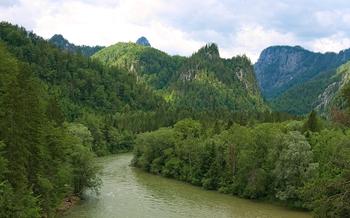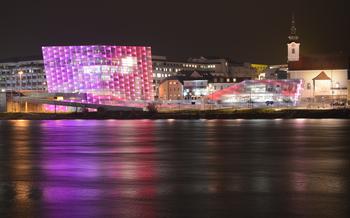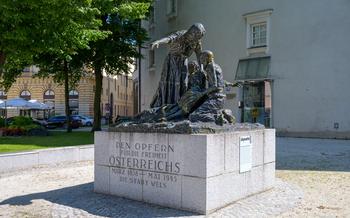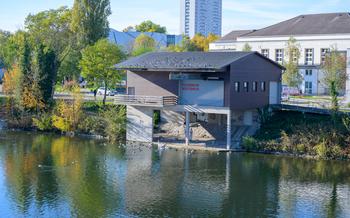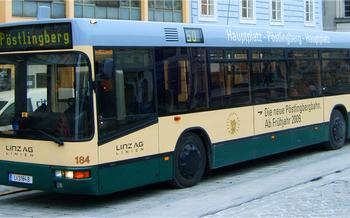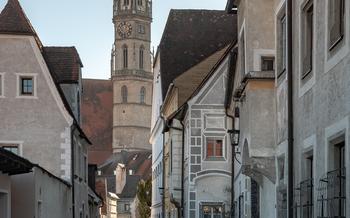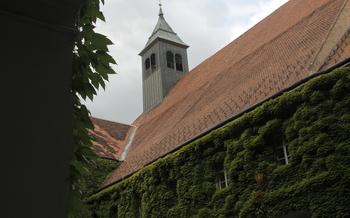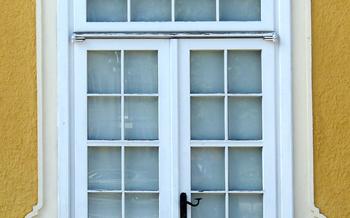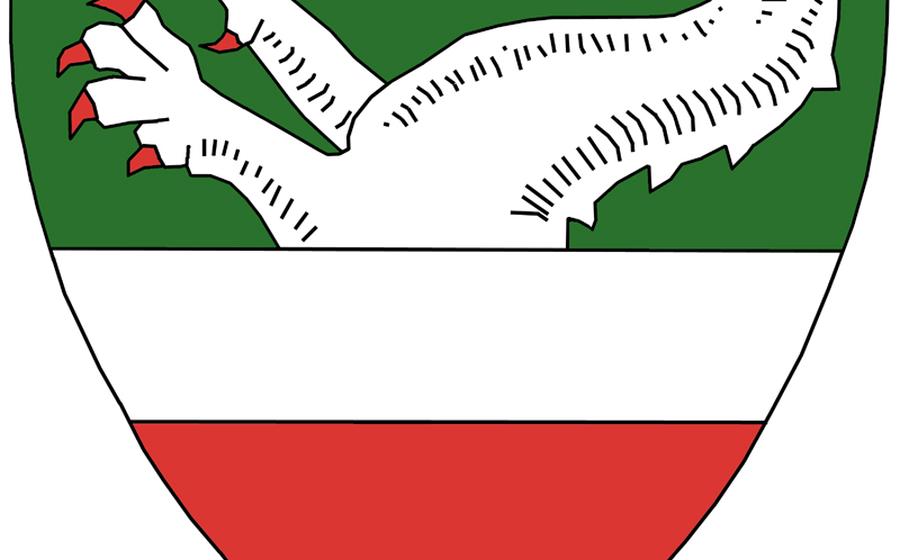
Gusen Memorial
- Location and Accessibility:
- Visiting Information
- Exhibitions and Displays
- Memorial Grounds
- Educational Programs:
- Personal Stories and Testimonies
- Remembrance and Reflection
- Challenges and Controversies:
- Art and Memorialization
- Surrounding Area
- Local Cuisine and Culture
- Accommodations and Logistics
- Ethical Considerations
- Insider Tip:
Location and Accessibility:
The Gusen Memorial is situated in the town of Gusen, approximately 15 kilometers east of Linz, the capital of Upper Austria. Visitors can conveniently reach the memorial by public transportation, with regular bus services departing from Linz's central bus station. The journey takes about 30 minutes, and the bus stop is located just a short walk from the memorial entrance. Alternatively, visitors traveling by train can take a train to the nearby town of Mauthausen and then transfer to a bus to Gusen. For those arriving by car, ample parking spaces are available at the memorial site. A detailed map or directions can be found on the memorial's official website to assist visitors in navigating to the location.
Visiting Information
Visiting the Gusen Memorial is a sobering and educational experience that offers a glimpse into the horrors of the Holocaust and the suffering endured by the prisoners. The memorial is open to the public daily, except for certain holidays, and visitors are encouraged to explore the site at their own pace. Guided tours are available in English and German for a small fee and provide a more in-depth understanding of the camp's history and significance. Audio guides are also available for rent, offering a self-guided tour with commentary and historical information. The duration of a typical visit to the memorial is around two hours, but visitors are welcome to spend as much time as they need to reflect and remember. Special events, such as memorial ceremonies and educational workshops, are held throughout the year, so it is worth checking the memorial's website for updates.
Exhibitions and Displays
The Gusen Memorial features a range of exhibitions and displays that document the history of the camp, the living conditions of prisoners, and the atrocities committed. These exhibits include photographs, artifacts, documents, and multimedia presentations that bring the past to life. Visitors can learn about the daily lives of prisoners, the forced labor they were subjected to, and the brutal treatment they endured. The exhibitions also shed light on the role of the Gusen concentration camp within the Nazi's larger system of oppression and extermination. Interactive elements and multimedia presentations enhance the visitor experience, providing a deeper understanding of the camp's history and its significance. Temporary exhibitions or special displays may also be on view during a visitor's visit, offering additional insights into specific aspects of the camp's history or the experiences of its victims.
Memorial Grounds
The memorial grounds of the Gusen Memorial are a powerful reminder of the horrors that took place during World War II. Visitors can explore the preserved barracks, watchtowers, and other camp structures, which provide a glimpse into the harsh conditions that the prisoners endured. The memorials and monuments dedicated to the victims of the camp serve as a poignant tribute to their suffering and sacrifice. Walking trails and paths allow visitors to explore the grounds at their own pace and reflect on the history of the camp.
Educational Programs:
The Gusen Memorial is dedicated to educating visitors about the history of the camp and its relevance to contemporary issues. It offers a range of educational programs and workshops designed to raise awareness and promote understanding of the Holocaust and its aftermath.
These programs are tailored to different audiences, including students, researchers, and the general public. Guided tours and audio guides provide visitors with a comprehensive overview of the camp's history, its role in the Nazi's forced labor program, and the atrocities committed.
The memorial also organizes workshops, lectures, and seminars that explore specific aspects of the camp's history, such as the experiences of survivors, the role of perpetrators, and the challenges of memorialization.
Through these educational programs, the Gusen Memorial aims to create a space for dialogue and reflection, encouraging visitors to confront the past and learn from history to prevent future atrocities.
The memorial also offers online resources and educational materials for those unable to visit the site in person. These resources include historical documents, survivor testimonies, and interactive educational tools that can be used in classrooms or for independent study.
Personal Stories and Testimonies
The Gusen Memorial preserves and shares the personal stories and testimonies of survivors and witnesses of the Gusen concentration camp. These firsthand accounts provide a powerful and deeply moving insight into the human suffering and resilience that unfolded within the camp's walls.
The memorial houses an archive of recorded interviews, written memoirs, and artifacts donated by survivors. Visitors can listen to audio recordings of survivors recounting their experiences, read their written testimonies, and view personal belongings that they brought with them to the camp. These personal stories offer a glimpse into the daily lives of prisoners, their hopes, fears, and struggles for survival.
The memorial also organizes events and exhibitions that feature the voices and experiences of survivors. These events provide an opportunity for visitors to meet and interact with survivors, hear their stories firsthand, and gain a deeper understanding of the impact of the camp on their lives.
By preserving and sharing these personal stories, the Gusen Memorial ensures that the voices of the victims are not forgotten and that their experiences continue to resonate with future generations.
Remembrance and Reflection
The Gusen Memorial serves as a place of remembrance and reflection, honoring the victims of the Holocaust and their suffering. Throughout the year, the memorial hosts various ceremonies, commemorations, and events to mark important anniversaries or remembrance days. These events provide an opportunity for visitors to come together and pay tribute to the victims, while also learning more about the history of the camp and its significance. Visitors are encouraged to participate in these acts of remembrance and leave personal tributes, such as flowers, candles, or messages, to honor the memory of those who lost their lives. By fostering a space for remembrance and reflection, the memorial helps to ensure that the victims of the Gusen concentration camp are never forgotten.
Challenges and Controversies:
The history of the Gusen concentration camp and its memorialization have not been without challenges and controversies. One significant issue has been the debate over historical accuracy and representation. Some critics have argued that the memorial does not adequately address the role of local communities in the operation of the camp or the complicity of certain individuals or institutions. Efforts have been made to address these concerns through ongoing research, revisions to the exhibits, and the inclusion of diverse perspectives in the memorial's narrative.
Another challenge has been the involvement of local communities in the memorialization process. Initially, there was resistance from some residents who felt that the memorial would attract unwanted attention or disrupt their daily lives. However, through dialogue and community engagement, the memorial has gradually gained acceptance and support. Local residents have participated in educational programs, guided tours, and commemorative events, helping to foster a sense of shared responsibility and remembrance.
Ongoing debates and discussions surrounding the interpretation or preservation of the site are part of the dynamic nature of memorialization. These debates reflect the complexity of the history and the need for a continuous re-examination of the past. The memorial strives to be open to dialogue and critical reflection, acknowledging that its representations and narratives may evolve over time as new information and perspectives emerge.
Art and Memorialization
The Gusen Memorial incorporates art and artistic expression as powerful tools to memorialize the victims of the concentration camp and convey the horrors of the past. Art installations, sculptures, and murals create a profound and emotional connection between visitors and the history of the site. One striking artwork is the "Monument to the Victims of Gusen," a large bronze sculpture depicting emaciated figures struggling to survive. The sculpture serves as a poignant reminder of the suffering endured by the camp's prisoners. Another notable artwork is the "Memory Wall," which features the names of thousands of victims etched into its surface. This wall symbolizes the collective memory of those who perished at Gusen and ensures that their stories are never forgotten. Through art, the memorial provides a space for reflection, remembrance, and a deeper understanding of the human tragedy that unfolded within its walls.
Surrounding Area
The Gusen Memorial is situated in a region rich in history and natural beauty. After your visit to the memorial, you can explore the surrounding area and discover a variety of attractions and points of interest.
Enns, the closest town to the memorial, is worth exploring for its well-preserved medieval center and 15th-century fortifications. Visitors can stroll along the scenic promenade, admire the Gothic architecture of the parish church, or visit the Enns Museum to learn about the town's past.
A short drive from Enns, you'll find the picturesque village of Mauthausen, known for its 16th-century castle and its association with the Mauthausen concentration camp. The Mauthausen Memorial Museum provides a detailed account of the camp's history and the atrocities committed there.
For a change of pace, head to the nearby countryside and immerse yourself in the tranquil beauty of the Mühlviertel region. This rolling landscape is dotted with charming villages, lush forests, and sparkling lakes. Visitors can enjoy hiking, biking, or simply relax in the peaceful surroundings.
Other notable attractions in the area include the Stift Wilhering, a magnificent Cistercian monastery founded in 1146, and the Linz Castle, a 16th-century Renaissance palace that houses the Upper Austrian State Museum.
Local Cuisine and Culture
The region surrounding the Gusen Memorial offers a rich culinary scene and a vibrant cultural heritage. Visitors can indulge in traditional Austrian dishes such as Wiener Schnitzel, Tafelspitz, or Kaiserschmarrn, often accompanied by a glass of local wine or beer. The area is also known for its delicious pastries and desserts, including Sachertorte, Apfelstrudel, and Salzburger Nockerl.
The cultural heritage of the region is diverse and fascinating. Visitors can explore nearby towns and villages to discover historic landmarks, museums, and cultural events. The city of Linz, just a short distance from Gusen, offers a vibrant arts scene with theaters, concert halls, and art galleries.
To fully immerse in the local culture, visitors are encouraged to visit local restaurants, cafes, and markets to sample regional delicacies. The region is home to many traditional taverns and inns serving hearty Austrian cuisine and offering a glimpse into the local way of life.
Accommodations and Logistics
When planning a visit to the Gusen Memorial, it's essential to consider accommodation options in the vicinity. Several hotels, guesthouses, and vacation rentals are available in the nearby towns of Enns, Mauthausen, and Linz. These accommodations offer a range of options to suit different budgets and preferences.
For those seeking a convenient and comfortable stay, the Hotel Gasthof Gierlinger in Enns is an excellent choice. This family-run hotel offers cozy rooms, a traditional Austrian restaurant, and easy access to the memorial. Alternatively, the Gästehaus Mauthausen provides a more budget-friendly option, with simple yet comfortable rooms and a convenient location near the Mauthausen Memorial.
To explore the region further, consider renting a car for easy transportation. This allows for flexibility and the freedom to visit other nearby attractions, such as the charming town of Steyr or the picturesque landscapes of the Salzkammergut region.
When visiting the Gusen Memorial, it's recommended to pack comfortable shoes and clothing suitable for walking, as the grounds are quite extensive. Additionally, it's advisable to bring a camera to capture the poignant memorials and exhibits, as well as a bottle of water and snacks to stay hydrated and energized during your visit.
Ethical Considerations
Visiting a site like the Gusen Memorial requires a deep sense of respect and ethical considerations. As visitors, it is essential to remember that the memorial is a sacred space dedicated to honoring the memory of the victims of the Holocaust. To ensure a meaningful and respectful experience, visitors should be mindful of their behavior and conduct while on the memorial grounds.
It is important to approach the site with humility and a willingness to learn from the past. Visitors should refrain from engaging in loud conversations, taking inappropriate photographs, or behaving in a manner that may disrupt the solemn atmosphere of the memorial. It is also essential to be respectful of the victims and their families by not making light of the atrocities committed or engaging in any form of hate speech or discrimination.
By being mindful of these ethical considerations, visitors can contribute to preserving the dignity and memory of those who suffered and perished at the Gusen concentration camp. It is through our collective remembrance and respect that we can work towards preventing such atrocities from happening again.
Insider Tip:
For a deeper understanding of the history and significance of the Gusen Memorial, consider joining one of the guided tours offered by former concentration camp prisoners or their descendants. These guided tours provide a unique perspective and personal insights into the experiences of those who endured the horrors of the camp. The guides share firsthand accounts, stories of survival, and the resilience of the human spirit in the face of adversity. Booking a guided tour in advance is recommended to secure a spot and ensure an enriching and memorable experience.
